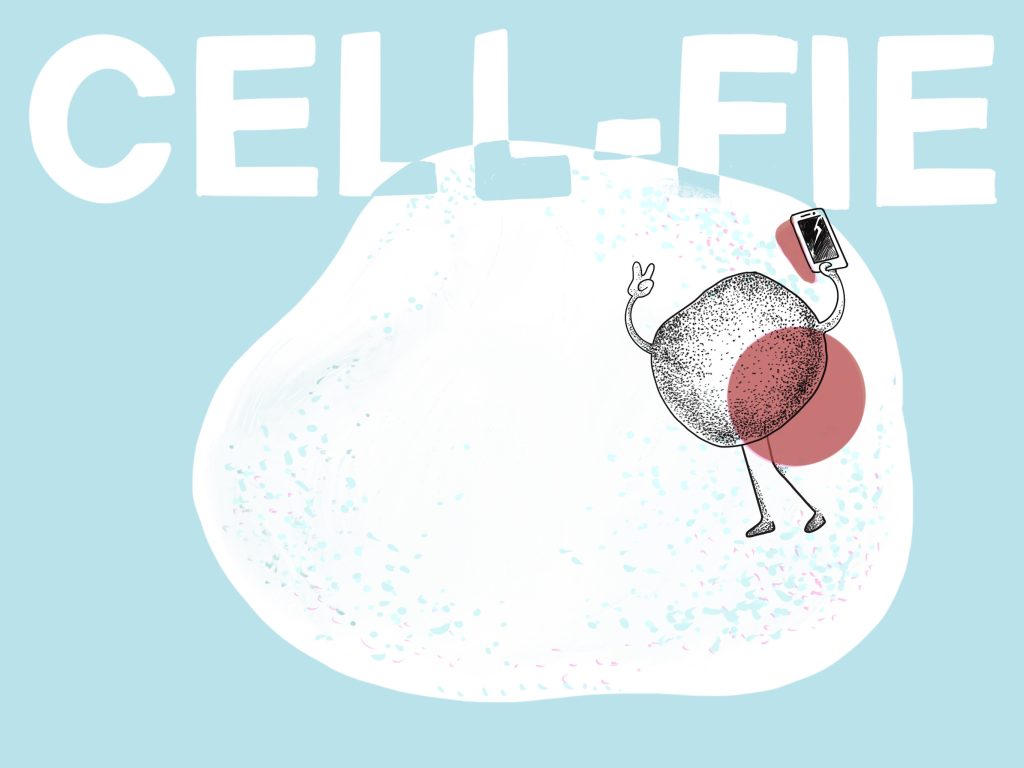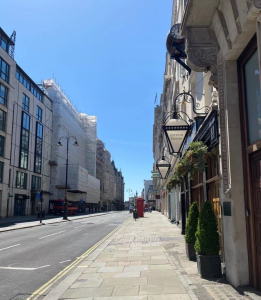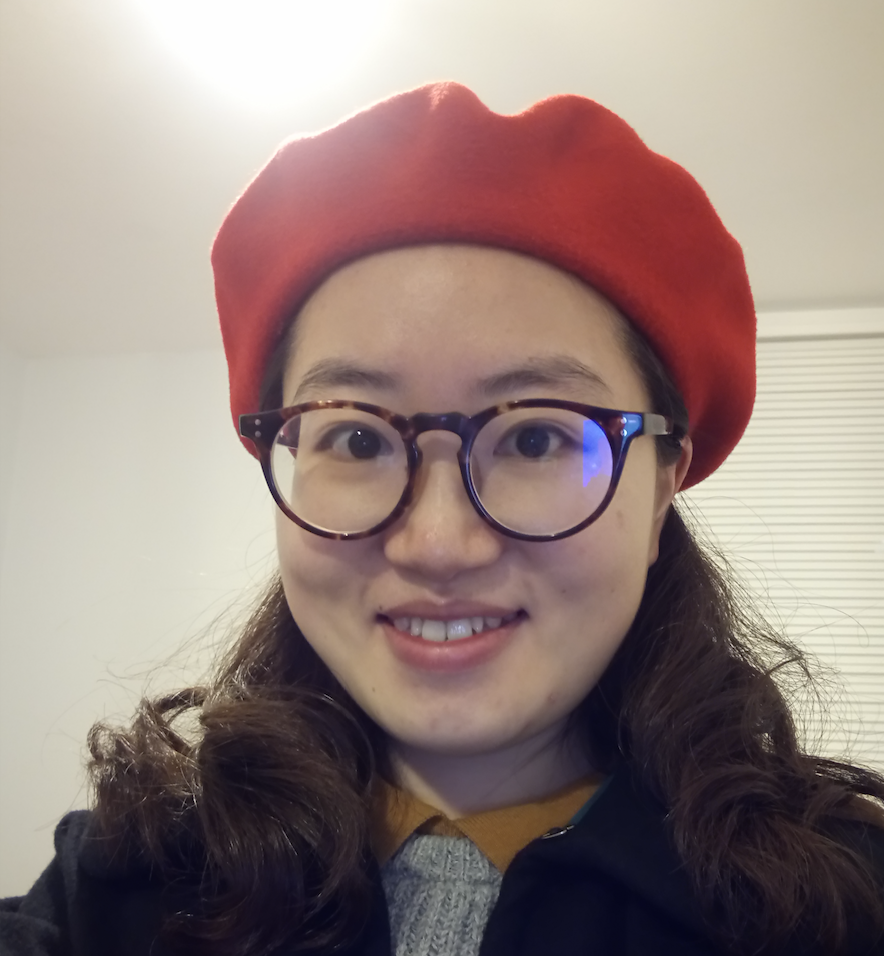The Life of a Cell in the Strand – an Interview
Posted in 2020-2029, 21st Century, contemporary, people, Stories, Strandlines, Strands and tagged with

Miao Zhao is a PhD candidate at the Department of Physics, King’s College London. She was one of these students who first returned to work in the lab at Strand Campus shortly after the lift of full lockdown and witnessed a Strand unprecedented. Here, she shares with us her personal experience and memory of a Strand life during a most un-Strand time.
*The text has been translated from Chinese by Can Ding the interviewer.
Interviewer
It has been more than two years since the first lockdown of the Covid-19 pandemic. You are one of those minorities who once lived an “unlocked” working life at a Strand so drastically changed to become almost unrecognisable. What made returning there possible for you?
Miao Zhao
I returned to Strand around June 2020 as I needed to use the lab for some experiment data; my supervisor applied an access for me. Students doing simulation, for instance, could work from home, but I couldn’t since my research is lab-based and highly interdisciplinary. I needed to first synthesize nanoparticles in a chemical lab then investigate its optical properties, and finally apply them in a living biological system for hopefully clinical use. Being medically related also gave me priorities when using lab facilities.
Interviewer
Does your research contribute to the pandemic?
Miao Zhao
No, it is mainly for tumours. It Could be used to kill bacteria or virus. But tumour is our main target.
Interviewer
The pandemic is not all about Covid. We all heard how non urgent medical treatments, including cancer operations, were delayed for prioritizing Covid patients at the beginning of pandemic. Do you think your research somehow helps to preserve lives of the patient groups suffered indirectly from Covid?
Miao Zhao
We research to conquer cancer cells, however, there is still a long way to go from basic medical research to clinic use; It is like the distance from Einstein’s theory of relativity to Global Positioning System. But in the long run, we do aim for the same thing which is to benefit human life.
Interviewer
I like that analogy. What is your usual activity at Stand lab? Was accessing the lab different during pandemic?
Miao Zhao
Our regular work is to manipulate equipment and reagents 1. Yes, I remember occupying a whole floor to myself at the beginning and had to report to my supervisor every time after arriving and before leaving the campus.
Interviewer
Was there noticeable impacts on your research due to Strand campus lockdown?
Miao Zhao
My progress was completely stopped at the beginning; it began to pick up thereafter but slower at large. Collaboration was also affected–supports from other departments and external institutions became either unavailable or highly delayed. For instance, experiment data normally received within days took months to arrive. Consequently, I had to optimize my experiment procedures and to improve on lab skills.
Interviewer
Does that make you think about becoming more self-sufficient in research at our own institution and less reliant on external collaborations as a way of future crisis management?
Miao Zhao
Yes, it is indeed a wake-up call to crisis management and a valuable point. But for me personally, I do not like such situation. Collaboration is always necessary and having our strength as well as weakness is not a problem at all. Not one university or institution are supposed to work independently–it is not good for achieving expertise.
Interviewer
Since you mentioned optimization, would you say there was growth as a researcher from this experience despite the interrupted collaboration?
Miao Zhao
I figured out solutions and made improvements for my research, however, it generally seemed a regression to me. Conducting scientific research in our age means being able to aim higher and bigger because the supporting system has improved over the years. So, it is not a good sign when doing research puts higher demands on the hand rather than the mind of the researcher, and not a good case where research skills honed due to the less ideal conditions such as Covid.
Of course, it only happened because of the pandemic. I don’t think it was a good time. A good time makes working life convenient and allows the fulfilment of intellectual potential and the creativity of mind. It was a bad time because to achieve our original goals we were forced to adapt.
Interviewer
It’s interesting what you just said resonates with the opening line of Dickens’s novel A Tale of Two Cities: “It was the best of times, it was the worst of times, it was the age of wisdom, it was the age of foolishness… we had everything before us, we had nothing before us.”
It strikes me how our experiences and realities could be full of paradoxes and perspectives (with pandemic or not). We make adaptations in all times but used to speak of them with proud tones as if overcoming difficulties.
Your reflection of being forced to adapt makes me wonder how our real thoughts could become visible to ourselves through the pandemic lens which otherwise might be either submerged in collective narratives or rephrased by them, in the so-called good normalities. You sounded quite resistant earlier, are you still feeling the same way to pandemic incurred changes?
Miao Zhao
For instance, one of our group members was forced to change his entire methodology. His original plan would be better. Isn’t it that we all prefer to conduct research in our scheduled way?
Interviewer
That is true. I’m just thinking about famous stories of accidental scientific discoveries, the kind of breakthroughs around the corner. I might be over-optimistic, but what do you think if the diversion is potential of opening new prospects?
Miao Zhao
Yes, many such stories in scientific history. As a research student, however, I still prefer to proceed along original path due to curiosity and demands. We prefer not be forced onto an alternative path even that may lead to new prospects. This way of moving forward in scientific research is not good because it seems to me full of uncertainties. Personally, I like proposing a hypothesis and proving its theoretical solidity as well as practicality through rigorous research and experiments.
Interviewer
What does being a scientist mean to you?
Miao Zhao
At the moment, I personally think scientists are a bunch of curious people with a thirst for truth, and if the truth they seek can help the lives of the general public, that’s a very cool thing.
Interviewer
Is there any change in the way you perceive your relation to work now?
Miao Zhao
I used to take it for granted that Strand campus and the lab would be open and wait for me every day until it shut down two years ago. That was the moment I ruefully acknowledged the countless things one fails to do. Now I see the lab and the facilities at Strand more as a precious resource offered to me. I appreciate my work and cherish the opportunity to work more than ever.
Interviewer
That sounds a very positive change. It makes me imagine a picture of human-environment interactions. All resources are finite in a sense, natural or social ones; what is your idea of resource utilization in scientific research now?
Miao Zhao
Firstly, I value the resources that I have at hand for research, which have been provided to me by my supervisor and the university. Of course these come from the taxpayer, and I think the taxpayer gives us these resources in the hope that we can find ways to make better use of the resources on this planet and thus help society as a whole to conserve them better. Personally, I am grateful and proud.
Interviewer
That is so nice. I’m curious if there was any moment then particularly impressive to you regarding your Strand experience?

Photo by Miao Summer of 2020.
Miao Zhao
Yes, I believe anyone who has been to Strand knows what it normally looks like. But that day two years ago, when on my way to the lab, I stood on the pavement where the Strand intersects Waterloo Bridge facing towards Charing Cross, I was shocked by how impossibly quiet the whole Strand had become. The usual hustle and bustle of the thoroughfare vanished as if into thin air. I’m not an emotional person, but that image was tremendously stirring— I immediately realized that was a once in a lifetime experience at Strand. I took a picture that day and can show you.
Interviewer
Lastly, can you give us a portrait of yourself or your life back then?
Miao Zhao
If you can picture an image of cells clustered together suddenly becoming singled out—that was my feeling of life then.

